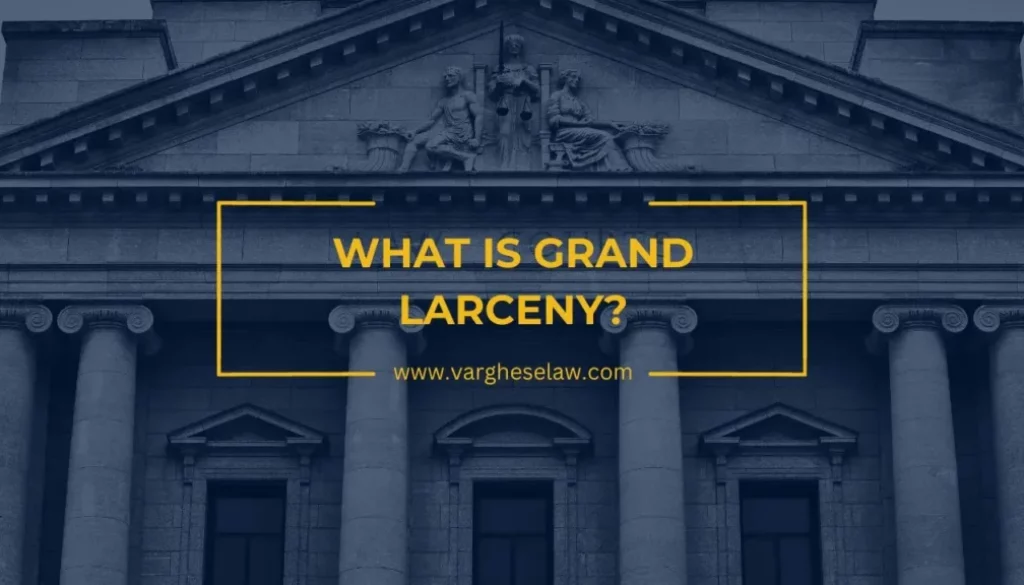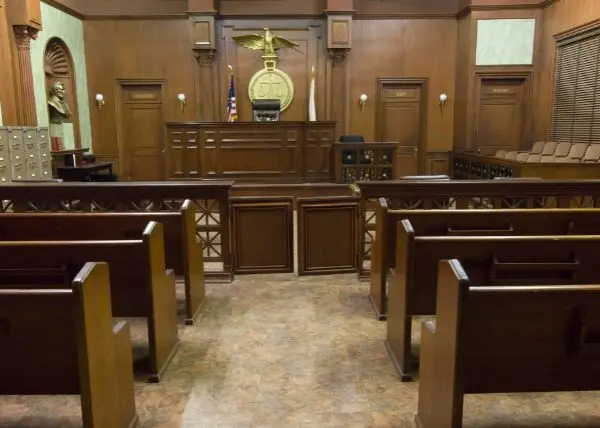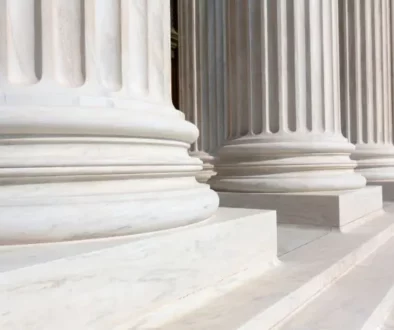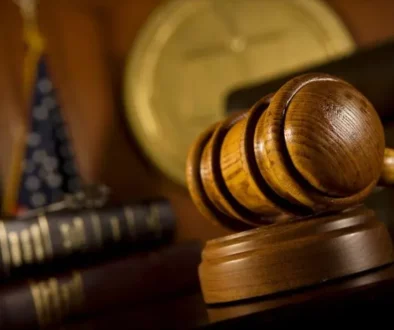What is Grand Larceny?
What is grand larceny? Grand larceny, a term often heard in legal discussions and crime reports, is a serious offense that carries significant legal consequences. This blog aims to demystify the concept of grand larceny, outlining what it entails, how it differs from petty theft, and the potential legal repercussions for those convicted.
What is Grand Larceny?
Grand larceny in New York City is a crime that involves the unlawful taking of property or money over a certain value threshold. It’s governed by New York State law, specifically under Article 155 of the New York Penal Law. Here’s a detailed overview:
Threshold for Grand Larceny:
In New York, the distinction between grand larceny and petty (or petit) larceny is based on the value of the stolen property. Grand larceny charges are applicable when the value of the property exceeds $1,000.
Degrees of Grand Larceny
- Fourth Degree (Penal Law §155.30): Theft of property valued over $1,000 but less than $3,000.
- Third Degree (Penal Law §155.35): Theft of property valued over $3,000 but less than $50,000.
- Second Degree (Penal Law §155.40): Theft of property valued over $50,000 but less than $1 million.
- First Degree (Penal Law §155.42): Theft of property valued over $1 million.
Types of Property
Grand larceny in New York can involve various types of property, not just money. It can include physical goods, real estate, data, or services.
Method of Theft
The method of theft can also affect the classification. For example, theft directly from a person (like pickpocketing), even if the value is less than $1,000, can be classified as grand larceny.
Penalties of Grand Larceny in NYC
In New York City, the penalties for grand larceny are governed by New York State law and are particularly stringent, reflecting the severity with which the state views this crime. The specific penalties largely depend on the degree of grand larceny the individual is charged with, which in turn is determined by the value of the property stolen. Here’s a more detailed look at these penalties:
Grand Larceny in the Fourth Degree (PL 155.30):
- Involves theft of property valued over $1,000.
- Classified as a Class E felony.
- Potential penalties include up to 4 years in prison.
Grand Larceny in the Third Degree (PL 155.35):
- Involves theft of property valued over $3,000 but less than $50,000.
- Classified as a Class D felony.
- Potential penalties include up to 7 years in prison.
Grand Larceny in the Second Degree (PL 155.40):
- Involves theft of property valued over $50,000 but less than $1 million.
- Classified as a Class C felony.
- Potential penalties include up to 15 years in prison.
Grand Larceny in the First Degree (PL 155.42):
- Involves theft of property valued over $1 million.
- Classified as a Class B felony.
- Potential penalties include up to 25 years in prison.
Besides imprisonment, other penalties and consequences include:
Fines
These can be substantial, sometimes up to double the offender’s gain from the crime.
Restitution
The court may order the convicted individual to pay restitution to the victim, compensating them for their financial loss.
Probation
This is a period of supervision in the community, during which the individual must comply with certain conditions set by the court.
Permanent Criminal Record
A conviction results in a criminal record, which can have long-term implications for employment, housing, and other areas of life.
Community Service
In some cases, the court may order the offender to complete a set number of hours of community service.
It’s important to note that the exact penalties can vary based on the circumstances of the theft, the individual’s criminal history, and other factors. New York laws also consider other aggravating circumstances, such as the method of the theft, which can lead to enhanced charges and penalties. For instance, theft involving a credit card, directly from a person, or by extortion can result in more serious charges.
Given the complexity of these laws and the severity of the potential penalties, individuals accused of grand larceny in NYC should seek competent legal representation. A skilled attorney can provide advice, negotiate plea deals, or represent the defendant in court to ensure their rights are protected and work towards the most favorable outcome possible.
Legal Defenses of Grand Larceny
Legal defenses against grand larceny charges are crucial, as a conviction can lead to severe consequences, including imprisonment and fines. Each case is unique, and the defense strategy depends on the specific circumstances. Here are some common legal defenses used in grand larceny cases:
Lack of Intent to Steal
One of the key elements in a larceny charge is the intent to steal. The defense might argue that the accused did not have the intention to permanently deprive the owner of their property, which is a critical component of the crime.
Claim of Right or Ownership
In some cases, the defense may assert that the accused believed in good faith that they had a legitimate claim to the property in question. This defense argues that there was no criminal intent as the accused thought they were entitled to possess or use the property.
Value of Property
The degree of grand larceny often depends on the value of the stolen property. The defense might challenge the prosecution’s valuation, arguing that the value is less than claimed, potentially leading to a lesser charge.
Mistake of Fact
This defense involves a genuine and reasonable mistake regarding a fact (not law) that, if true, would make the action non-criminal. For example, taking someone else’s property thinking it was yours due to a similar appearance.
Duress or Coercion
If the accused committed the theft under duress, such as being forced or threatened by someone else, this defense could be used. It must be demonstrated that the accused had a reasonable fear of immediate harm.
Entrapment
This defense is applicable if the accused was induced to commit the crime by law enforcement officers or their agents. Entrapment occurs when the idea of committing the crime was planted in the mind of the accused by the police, rather than originating with the accused.
Insufficient Evidence
The defense might argue that the prosecution has not met its burden of proof. For a conviction, the prosecution must prove each element of the crime beyond a reasonable doubt.
Alibi or False Accusation
The defendant could provide an alibi, proving they were elsewhere when the crime occurred. Alternatively, they might argue that they have been falsely accused or misidentified.
Each defense strategy must be carefully considered and expertly argued. This is why individuals facing grand larceny charges are advised to seek the assistance of a skilled criminal defense attorney who can evaluate the specifics of their case and formulate an appropriate defense strategy.
How Varghese & Associates, P.C. Can Help
At Varghese & Associates, P.C., we specialize in providing top-tier legal representation for those facing grand larceny charges in New York City. Our approach is client-focused and results-driven, offering comprehensive support through every step of the legal process. Here’s how we can assist:
Experienced Legal Guidance
Our team, led by seasoned attorneys, brings extensive knowledge of New York’s legal system, particularly in matters of grand larceny. We provide expert advice tailored to the specifics of your case.
Personalized Defense Strategies
Understanding that each case is unique, we develop personalized defense strategies. Whether challenging the valuation of stolen property, questioning the evidence of intent, or negotiating plea deals, our tactics are always customized to suit your specific situation.
Thorough Investigation and Evidence Analysis
We conduct meticulous investigations and analyses of all evidence. By scrutinizing police reports, witness statements, and surveillance footage, we ensure no stone is left unturned in your defense.
Court Representation
Our criminal defense attorneys are experienced litigators, ready to represent you in court. We argue your case with conviction and clarity, aiming to secure the most favorable outcome.
Negotiations with Prosecutors
With a deep understanding of prosecutorial tactics, we effectively negotiate to reduce charges, minimize penalties, or even get charges dismissed where possible.
Support and Communication
Navigating the legal system can be daunting. We keep you informed at every stage, providing clear communication and emotional support. Our team is always accessible to answer your questions and address your concerns.
Protecting Your Rights
Above all, we are committed to protecting your rights. From ensuring lawful police conduct to advocating for your best interests, safeguarding your legal rights is at the core of what we do.
If you’re facing grand larceny charges, don’t delay in seeking legal help. Contact Varghese & Associates, P.C. today to get the dedicated and effective legal representation you need. Together, we can work towards the best possible resolution for your case.
Act Now: Protect Your Future
Facing grand larceny charges in New York City? It’s time to take action. The consequences are serious, but a charge does not mean a conviction. With Varghese & Associates, P.C., you have a team ready to fight for your rights and seek the best possible outcome.
Don’t let the complexity of the law overwhelm you. Reach out to us for a consultation, and let’s start building your defense today. Your future deserves the best defense, and we’re here to provide it.





